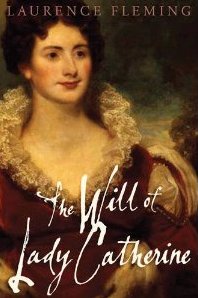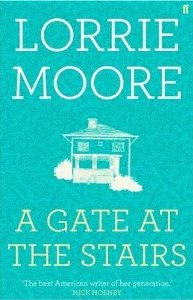They say women past a certain age can’t get work in broadcasting. In more enlightened times, Mavis Nicholson was the first woman to interview on daytime television. She had given up a career in advertising, married, and had children by the time she started presenting in 1972. She was talent-spotted by Jeremy Isaacs on the dinner-party circuit, where her penchant for asking searching questions was deemed ideal for the new dawn of daytime. By 1997, when she last worked in television, she had interviewed David Bowie and Elizabeth Taylor, Peter Cook, Kenneth Williams, Morecambe and Wise, Liberace and Maya Angelou, who saw her grilling John Cleese on TV and became a friend.
 The Will of Lady Catherine, a book in the style of Jane Austen. It’s a very quick read and a very good piece of writing by Laurence Fleming. He wrote to me and reminded me that we met at a dinner party 40 years ago and we had sung "We’ll Gather Lilacs in the Spring Again" and asked if I’d read his three "Austenesque" novels. The first one I am reading is really polished, very fast flowing. It reminds you so much of Austen that you can’t believe it isn’t Jane!
The Will of Lady Catherine, a book in the style of Jane Austen. It’s a very quick read and a very good piece of writing by Laurence Fleming. He wrote to me and reminded me that we met at a dinner party 40 years ago and we had sung "We’ll Gather Lilacs in the Spring Again" and asked if I’d read his three "Austenesque" novels. The first one I am reading is really polished, very fast flowing. It reminds you so much of Austen that you can’t believe it isn’t Jane!The Great Gatsby by F Scott Fitzgerald. This book is a corker - just so romantic, so sad, so glamorous that I fall for it every time. Also I sometimes think to myself, shall I read Daphne du Maurier’s Rebecca again? And it’s still a good yarn but maybe not quite as good as I first thought it was. And for nearer-to-home reasons, I often dip into Take a Girl Like You by Kingsley Amis, which was dedicated to my husband and me. He used to ask Hilly, his first wife, and me to help him out on what kind of clothes Jenny Bun, his heroine would be likely to wear.
 [Extract from The Great Gatsby by F Scott Fitzgerald, Penguin Modern Classics]
[Extract from The Great Gatsby by F Scott Fitzgerald, Penguin Modern Classics]There was music from my neighbor’s house through the summer nights. In his blue gardens men and girls came and went like moths among the whisperings and the champagne and the stars. At high tide in the afternoon I watched his guests diving from the tower of his raft, or taking the sun on the hot sand of his beach while his two motor-boats slit the waters of the Sound, drawing aquaplanes over cataracts of foam. On week-ends his Rolls-Royce became an omnibus, bearing parties to and from the city between nine in the morning and long past midnight, while his station wagon scampered like a brisk yellow bug to meet all trains. And on Mondays eight servants, including an extra gardener, toiled all day with mops and scrubbing-brushes and hammers and garden-shears, repairing the ravages of the night before.
Every Friday five crates of oranges and lemons arrived from a fruiterer in New York — every Monday these same oranges and lemons left his back door in a pyramid of pulpless halves. There was a machine in the kitchen which could extract the juice of two hundred oranges in half an hour if a little button was pressed two hundred times by a butler’s thumb.
At least once a fortnight a corps of caterers came down with several hundred feet of canvas and enough colored lights to make a Christmas tree of Gatsby’s enormous garden. On buffet tables, garnished with glistening hors-d’oeuvre, spiced baked hams crowded against salads of harlequin designs and pastry pigs and turkeys bewitched to a dark gold. In the main hall a bar with a real brass rail was set up, and stocked with gins and liquors and with cordials so long forgotten that most of his female guests were too young to know one from another.
A Gate at the Stairs by Lorrie Moore, a contemporary American writer, shortlisted for the Orange Prize. My friend, Catherine Freeman, whom I was staying with, lent me it on hols in Ireland and it grabbed me straightaway. The heroine’s voice is a touch zany, and there's a different kind of thinking coming from the author that's not quite like any other voice I’ve come across before. It’s about a 20-year-old who is drawn into the life of a couple and their adopted baby - a coming-of-age drama, and captivating.
 [Extract from A Gate at the Stairs by Lorrie Moore, Faber & Faber]
[Extract from A Gate at the Stairs by Lorrie Moore, Faber & Faber]I was looking in December for work that would begin at the start of the January term. I'd finished my exams and was answering ads from the student job board, ones for "childcare provider." I liked children — I did! — or rather, I liked them OK. They were sometimes interesting. I admired their stamina and candor. And I was good with them in that I could make funny faces at the babies and with the older children teach them card tricks and speak in the theatrically sarcastic tones that disarmed and enthralled them. But I was not especially skilled at minding children for long spells; I grew bored, perhaps like my own mother. After too much time playing their games, my mind grew peckish and longed to lose itself in some book I had in my backpack. I was ever hopeful of early bedtimes and long naps. I had come from Dellacrosse Central, from a small farm on the old Perryville Road, to this university town of Troy — "the Athens of the Midwest" — as if from a cave, like the priest-child of a Columbian tribe I'd read of in Anthropology, a boy made mystical by being kept in the dark for the bulk of his childhood and allowed only stories — no experience — of the outside world. Once brought out into light, he would be in a perpetual, holy condition of bedazzlement and wonder; no story would ever have been equal to the thing itself. And so it was with me. Nothing had really prepared me. Not the college piggy bank in the dining room, the savings bonds from my grandparents, or the used set of World Book Encyclopedias with their beautiful color charts of international wheat production and photographs of presidential birthplaces. The flat, green world of my parents' hogless, horseless farm - its dullness, its flies, its quiet ripped open daily by the fumes and whining of machinery — twisted away and left me with a brilliant city life of books and films and witty friends. Someone had turned on the lights. Someone had led me out of the cave — of Perryville Road. My brain was on fire with Chaucer, Sylvia Plath, Simone de Beauovoir. Twice a week a young professor named Thad, dressed in jeans and a tie, stood before a lecture hall of stunned farm kids like me and spoke thrillingly of Henry James's masturbation of the comma. I was riveted. I had never before seen a man wear jeans with a tie.
- Find A Gate at the Stairs on Amazon
- What Did You Do in the War, Mummy? (Seren) is out now. Find Mavis Nicholson on Amazon
- What I'm Reading: other guests include ballerina Tamara Rojo, songwriter Tom Russell, theatre designer Tobias Hoheisel, sculptor Cornelia Parker, musician Mike Scott, dramatist Patrick Marber, dancer Carlos Acosta, author Tibor Fischer, conductor Peter Phillips and musician Martha Wainwright















Add comment